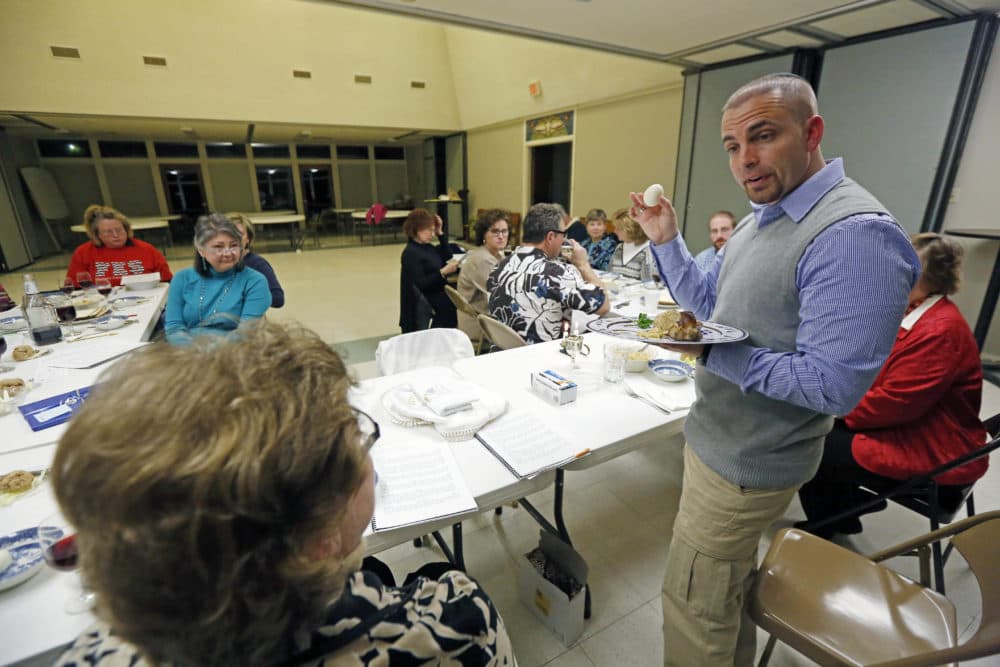Advertisement
Commentary
Are Non-Jews Who Host A Seder Sharing Jewish Culture Or Hijacking It?

The shark of anti-Semitism is swimming in conservative and progressive currents of global affairs.
This bigotry is the best of several reasons to celebrate the fact that a lot of Seders this week will be held by — Christians. (Passover begins at sundown on Good Friday this year.) Yet the recent trend of non-Jews preparing the ritual Passover meal, before putting out the Easter eggs, offends some in both communities as cultural hijacking.
A supposedly broad-minded Episcopalian priest warns that Christian Seders involve “ripping off the spirituality of others” — a bizarre complaint from a woman whose Bible rips off the Hebrew scriptures, and whose faith rips off the idea of a Jewish messiah.
As religion scholar Mark Silk explains, objections to gentile Seders are a case of closing the barn door long after the theological horse has galloped off: “Christians started off as Jews, and if we started to ask them to strip away all the Jewish textual and liturgical and theological appropriations they’ve made over the years, there wouldn’t be a lot left of the religion.”
The practical impossibility of de-Judaizing Christianity aside, sharing customs like the Seder, if done properly, might promote some desperately needed interfaith understanding.
... one person’s appropriation can be another’s cultural sharing, and people are better for sharing cultures.
My Catholic church used to host the occasional Seder (we stopped, only because of the time-consuming work involved). I continue the tradition in a small way: my Easter dinner often includes homemade matzo ball soup and haroset (a tasty apples-and-nuts dish), along with macaroons. So I shifted uncomfortably when I first heard the notion, at a talk years ago, that Christian Seders run a cultural red light.
The speaker, noted Vanderbilt professor and Orthodox Jew Amy-Jill Levine, said New Testament claims that the Last Supper was a Seder are persuasively disputed by John’s gospel. Anyway, since Christianity views Jesus as the “Paschal Lamb” sacrificed for the world, replacing the actual Passover lamb, she urged Christians to keep hands off this tradition.
Normally, compliance would be dictated by respect for others’ sensibilities, except that Silk is not the only Jew who welcomes Christian Seders, provided hosts don’t diminish their Jewishness.
At my church’s version, Father Tom, a Hebrew Bible scholar, guided us through the Haggadah (Seder liturgy); explained the significance of each ritual food in the Exodus story, which Passover celebrates; and led us in Hebrew song. He also pointed out the parts of the liturgy from which the church derived Mass prayers — one reason, he noted, that our observance could not be truly Jewish, but rather as close to a Reform Jewish Seder as a bunch of Christians could get.
... sharing customs like the Seder, if done properly, might promote some desperately needed interfaith understanding.
And if the Last Supper wasn’t a Seder? I didn’t attend with the unshakeable conviction that it was. (If literal history is the concern, recall that neither the Exodus nor Jesus’ final meal necessarily happened as biblically recounted.) Instead, I went for fellowship and to explore my faith’s roots. I say this as an Irish Catholic who has, when asked, helped non-Catholics experience Mass, and who couldn’t care less if non-Celts partake in corned beef on St. Patrick’s Day.
Today's cultural appropriation police engage in overkill in realms besides religion. African Americans have been criticized for wearing African fashion and tribal marks, prompting a rejoinder from University of California-Irvine law professor Olufunmilayo Arewa:
The reality of human experience is that borrowing and cultural mixture are widespread. This is evident in language, religion, agriculture, folklore, food and other cultural elements. … Discussions of appropriation may also take insufficient account of the importance and benefits of borrowing. Borrowing has led to the international spread of denim, mathematics, and even democracy.
Arewa suggests that sampling others’ culture becomes objectionable only when it involves profiteering without acknowledging the originating culture. She cites the blockbuster song “The Lion Sleeps Tonight,” derived from a 1939 composition by Zulu musician Solomon Linda, who got little remuneration for it in his day. His family had to file suit for compensation.
Some Christians might experience Passover if Jewish friends invite them to their Seders. But if such an invitation isn’t forthcoming, Arewa reminds us that one person’s appropriation can be another’s cultural sharing, and people are better for sharing cultures.
Mass murderers won't ever sing “next year in Jerusalem,” but toxic stereotypes of Jews held by run-of-the-mill bigots might be vulnerable to encounters with Jewish life, such as a Seder. Haters in other contexts, after dialogue with the targets of their prejudice, sometimes emerge free of hate. And Passover celebrates freedom.
